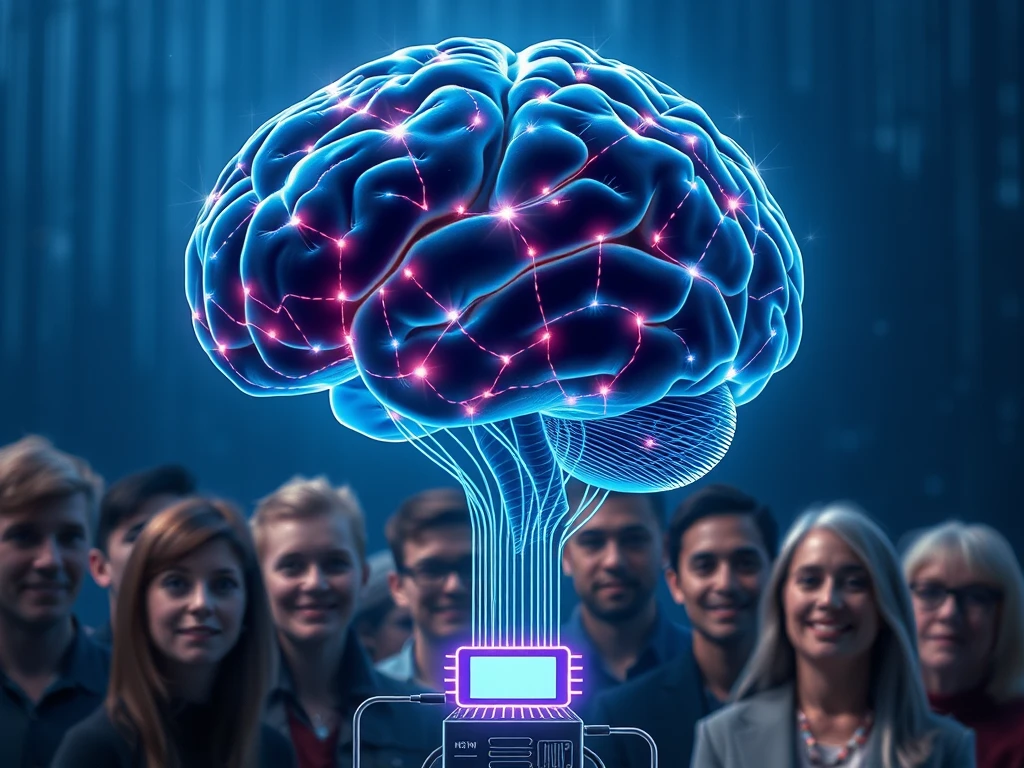Revolutionary Neuralink Brain Chips: Elon Musk’s Global Patient Search Begins

Exciting news in the tech and crypto sphere! Elon Musk’s groundbreaking company, Neuralink, is taking a giant leap forward. They’re now seeking participants worldwide for their brain chips clinical trials. Imagine controlling computers just with your thoughts – sounds like science fiction, right? But Neuralink is turning this into reality, and the crypto community, always at the forefront of innovation, should pay close attention to this intersection of technology and human potential.
What’s the Buzz About Neuralink’s Brain Chips?
For those unfamiliar, Neuralink is Elon Musk’s ambitious venture into brain-computer interface (BCI) technology. Their goal is to create implantable brain chips that can interface directly with the human brain. This isn’t just about futuristic gadgets; it’s about potentially revolutionizing how we interact with technology and even addressing neurological conditions.
Here’s a quick breakdown:
- The Goal: To develop a fully implantable, wireless brain-computer interface aimed at helping people with paralysis regain independence and potentially unlock human potential.
- The Technology: Tiny, flexible threads are implanted into the brain, recording neural activity and transmitting it wirelessly to a computer.
- Current Status: Neuralink has already implanted devices in three patients as part of their PRIME study and is now expanding their search for more participants globally.
Global Call for Clinical Trials: Who is Neuralink Looking For?
Neuralink’s recent announcement is a global call to action. They are specifically seeking individuals with quadriplegia – those who have lost the ability to use their limbs. This clinical trial, known as the PRIME (Precise Robotically Implanted Brain-Computer Interface) study, is a six-year undertaking. It aims to assess the safety and effectiveness of their brain chips in enabling people to control external devices with their thoughts.
Key criteria for potential participants include:
- Diagnosis of quadriplegia due to spinal cord injury or Amyotrophic Lateral Sclerosis (ALS).
- Age 18 years or older.
- Caregiver support.
If you or someone you know fits this description, and are interested in potentially participating in cutting-edge clinical trials, you can find more information on Neuralink’s website.
Elon Musk’s Vision: Beyond Computer Control
While the current focus of Neuralink’s brain chips is enabling individuals to control computers and smartphones with their thoughts, Elon Musk’s vision extends far beyond. He has publicly stated his ambition to “give people superpowers.” This hints at a future where brain-computer interfaces could enhance human capabilities in various ways, from improving memory and learning to even telepathic communication.
Musk’s involvement adds another layer of intrigue. Known for his ventures like Tesla and SpaceX, his foray into neurotechnology with Neuralink is watched closely by tech enthusiasts and investors alike, including those in the cryptocurrency space who are always looking for disruptive technologies.
Early Patient Success: Noland Arbaugh’s Inspiring Story
Noland Arbaugh, Neuralink’s first patient, has shared incredibly positive updates after a year with his brain chip implant. He reported “no negative side effects, neither physically nor psychologically.” His experience is truly inspiring:
- Daily Usage: Arbaugh uses his brain chip for over 10 hours a day for various tasks, including browsing the internet, writing, and communicating online.
- Improved Quality of Life: He credits the implant with giving him “hope and purpose,” allowing him to work as a traveling keynote speaker.
- Future Applications: Neuralink researchers are even working on using the implant to control a wheelchair, further expanding its potential impact.
Arbaugh’s story provides tangible evidence of the potential benefits of brain-computer interfaces and fuels optimism about the future of this technology.
Brain-Computer Interfaces: A Glimpse into the Future?
Neuralink is not alone in the brain-computer interface field. Several companies and academic institutions are actively developing and testing various approaches, ranging from invasive implants to non-invasive wearable devices. This growing field signifies a potential paradigm shift in how humans interact with technology.
Potential benefits of widespread BCI adoption could include:
- Medical Breakthroughs: Treating neurological conditions like paralysis, Parkinson’s disease, and epilepsy.
- Enhanced Human Capabilities: Improving cognitive functions, memory, and communication.
- New Forms of Human-Computer Interaction: Seamless and intuitive control of devices and digital environments.
However, challenges and ethical considerations remain:
- Safety and Long-Term Effects: Ensuring the safety and long-term viability of implantable devices.
- Data Privacy and Security: Protecting sensitive brain data from misuse.
- Ethical Implications: Addressing questions about human augmentation, identity, and access to this technology.
Conclusion: A Revolutionary Step Forward
Elon Musk’s Neuralink seeking global patients for clinical trials is a significant milestone in the development of brain-computer interfaces. The potential to restore function for people with paralysis and unlock new possibilities for human enhancement is truly revolutionary. As this technology progresses, it will undoubtedly spark further discussions and developments across various sectors, including the ever-evolving world of cryptocurrency and decentralized technologies, which thrive on innovation and future-forward thinking. Keep watching this space – the future of human-computer interaction is unfolding before our eyes!









